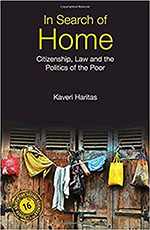At first glance it might seem like I am trying to compare apples and oranges in this review as Haritas is a political anthropologist of the city and Haripriya is a poet and a writer, so the books are quite different in their approach and perspective. The reason for doing a joint review is to understand the interdisciplinary nature of the concept of home, in relation to migration, survival and identity. Home and homeland are concepts related to subsistence, economic survival and identity, belongingness and emotion. In the last thirty years, home has become an important topic of research for economists, migration and diaspora scholars, sociologists, historians and anthropologists. Writers and poets have romanticized as well as problematized the concept of home. It is related to pain and pleasure, to citizenship, national identity, deportation and exile. Both the books were completed before the Covid-19 pandemic and mention that there may be new ways of understanding the meanings of home post-pandemic.
Kaveri Haritas has conducted longitudinal ethnography in a Bangalore slum. She examines complicated and messy governance and rehabilitation issues while drawing heavily from theoretical literature on urban poverty and politics. The Karnataka government proposes rehabilitation of the evicted poor but Haritas shows systematically the gap between existing realities and the official stance which is closer to political rhetoric. She shows how displacement is often normalized, and resistance turns into negotiations for rehabilitation, by following the lives of 50 families in Laggere, in southwest Bangalore. The research also focuses on the facilitators of rehabilitation, local politicians, slum leaders and the bureaucrats, and through them the complexities of the relations between the state and the poor who are struggling with citizenship and home issues.

